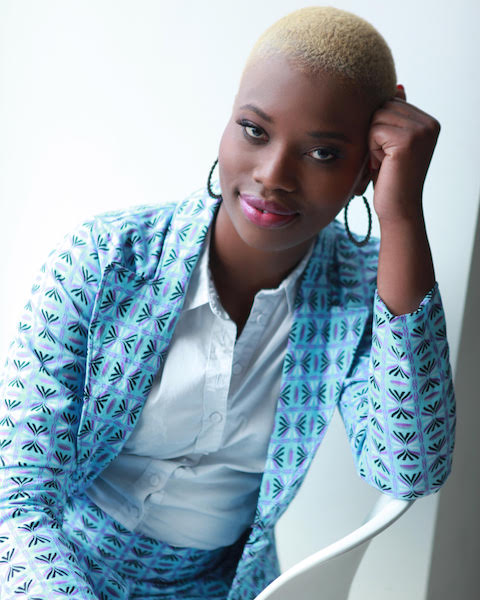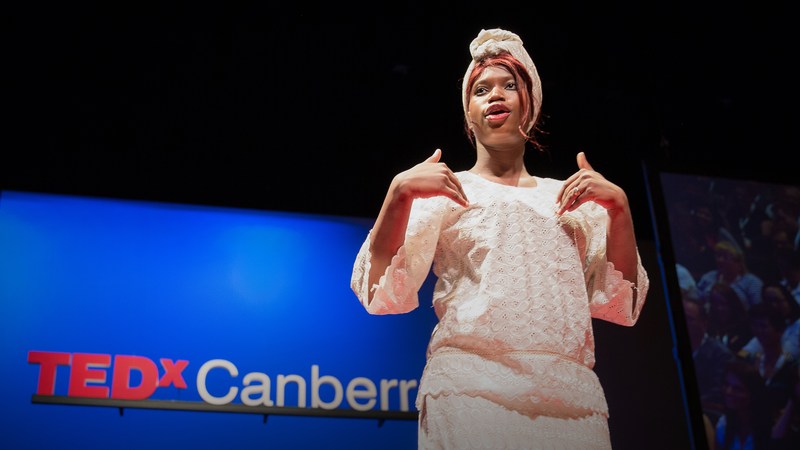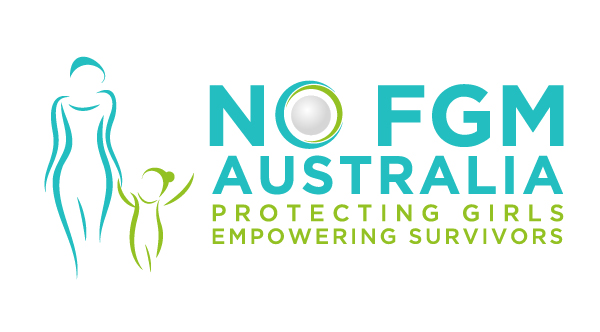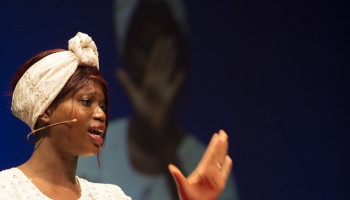Khadija Gbla, Survivor of Female Genital Mutilation, Turned Her Anger with Injustice Into Action to Protect Girls at Risk of FGM

Since she was only 13 years old, FGM survivor Khadija Gbla has been an outspoken advocate working to eradicate the brutal practice of mutilating little girls. In her Ted Talk that has been viewed over 1 million times, Khadija infuses her innate sense of humor into a description of the disturbing experience of undergoing FGM as a young girl and how it changed her life. Now the Executive Director of “No FGM Australia,” Khadija is working tirelessly to protect those at risk, empower survivors and end the brutal practice of FGM. We reached out to Khadija to hear about and learn from her experience with helping the survivors, educating healthcare professionals and protecting girls at risk of mutilation in Australia.
AHA: In an interview for The Guardian you mentioned that you do not like being the face of FGM but you must break the silence. What drives your dedication to speak about and work to stop FGM?
Khadija: Once I had realized what happened to me and the impact it has had on my life, I was imagining that so many other girls were experiencing the same abuse I survived and dealing with these consequences for the rest of their life. I was angry. I was angry with my mom for allowing this act to be done to me, for paying someone to mutilate me. Angry at the injustice of it, angry at how it was allowed to happen, and the price that girls like me have to pay for the rest of our lives.
“FGM is happening in Australia and FGM is something that we all need to take ownership of and end together as a community.”
I wanted to do something. I think there was a part of me that felt like I needed an outlet and I felt that a starting point would be to just speak up. Growing up I didn’t hear anyone speaking up against the experience, and coming to Australia, it wasn’t something that was discussed. I felt like that was part of the problem, no one knew this was happening to little girls. So that is where I was coming from, this happened to me, this is an injustice. I was going to take a stand, and the beginning was just sharing my experience, and hoping that connected with people. That through doing that I could create the awareness that FGM is happening to little girls. FGM is happening in Australia and FGM is something that we all need to take ownership of and end together as a community. This is why I spoke up.
And there is a cost when you put your face to something. Becoming the face of FGM is not easy. It’s not the sexiest thing out there. I always say to people “I have nice lips I would like to be the face of a lipstick,” not so much the face of a brutal act. But that is the price we have to pay to make true change. And I feel that with issues that are very sensitive and issues that people consider cultural, if you don’t put a face to it, put a human element to it, people don’t acknowledge it, people turn away, and disengage. It becomes just a theoretical issue. But seeing a person who has gone through this, is to see this is why we need to stop it. I think that element is powerful. So I have to be the guinea pig because unfortunately it felt like it was up to me to do that. And it’s not like I walk around thinking “Gee, it’s nice to be the face of FGM.” No, I’d like to be the face of a pair of jeans, or a lipstick.
AHA: In your Ted Talk you speak about how you initially learned you had undergone FGM while volunteering for a women’s health organization on their FGM program as a teenager. What piece of advice would you give to a young woman in that situation now?
Khadija: Well, the unfortunate thing is that if FGM is performed on you when you’re quite little, it can be quite easy to not remember, or even suffer from amnesia like I did because it was so traumatic that my mind had to block it off completely. And in fact, through my work I have had someone come into one of my clinics, a young woman who comes from a community that practices FGM, she came in for a checkup and she said “I want somebody to check if FGM was performed on me.” So we had that request.
“I want to empower young women to be able to stand up for themselves and say ‘this is my body and no one gets to mutilate or alter it for any reason.’ ”
The advice I have for these young women is, don’t be scared to ask the questions. To ask, “Is this something we perform in our family, is this something we believe in?” Ask if your mom, or older sister, if they have undergone FGM. Because the important thing to remember is this, if your mom has undergone FGM and your older sister has, but you haven’t yet, you are still more than 90% at risk of having it done to you at some point. And that becomes a child protection issue.
I want to empower young women to be able to stand up for themselves and say, “This is my body and no one gets to mutilate or alter it for any reason.” And given that we have a child protection system, to be able to call organizations like No FGM Australia, for help, or the police. Asking those questions in the family is very important and can be the difference between a little girl getting mutilated and one that is not.
And if now an older sister is in the place to realize this is something that was done to them and their younger sister is next in line to have it done, they can be in a place to say “Actually, hold on, maybe this is something that we don’t need to do to my little sister. There are no health benefits whatsoever, and this seems so unnecessary.” Hopefully they will be inspired. We have also experienced this where big sisters call our hotline worried about their younger siblings and making sure there is protection for their siblings.
“Bad things happen, but I always say that it is how we choose to deal with it that determines how our journey takes place.”
But the most important thing I can say to a young woman who is facing this experience is to say you are not alone. You are a part of 200 million women and girls worldwide who have experienced this act. It is unfortunate this has happened to you. I am sorry you had to go through this. It was unnecessary and is a form of child abuse. And I hope that somehow in dealing with your feelings about this that you find a way to reconcile with what has been done to you and your position on it. And whatever that looks like for you is fine, and legitimate. You don’t have to be angry, or sad if you don’t want to be. I just hope that if you are struggling you ask for help and you can realize that you are not broken or imperfect. You are still beautiful and are still a woman who can live a full and happy, healthy life. Bad things happen, but I always say that it is how we choose to deal with it that determines how our journey takes place.
AHA: If you were training doctors/service professionals to help girls who have undergone FGM, how would you advise them to approach the issue?
Khadija: In fact, this is my job on a day to day basis, training health and service professionals. And my message is always that FGM is a human rights issue not a cultural issue. Every child deserves to be protected regardless of their cultural or religious background. All children should be afforded the same protection. FGM is a form of child abuse and a human rights violation. That is how it needs to be framed and should be how we deal with the issue.
If you are a doctor, take notes when a client comes in to see you and has already had FGM done to her. Also check to see if she has a daughter, make sure you have a conversation with that woman that FGM is illegal, FGM has no health benefits, and in fact has lifelong health consequences. Also if you do see a little girl come in to see you and she comes from a community that practices FGM, as a part of your history taking check if she has had FGM, ask her if she has been cut when she was little. Do a health checkup, which should be part of a general holistic health checkup to not alienate the young woman. And document if FGM has been performed. And if FGM has not been performed also make note of that and keep track of this every time she comes in, because at some point this child may be a risk of having this done. It is a matter of being very proactive and taking on the role of child protection to make sure that this doesn’t happen.
If a woman comes to you who is already dealing with the side effects of FGM, it is important to be aware and have a full history and also verify which type of FGM was performed. And once you have been able to do this and speak to the woman about the types of health consequences she is experiencing, it is a matter of having a plan to deal with these side effects, because it is most likely something she is going to be dealing with for the rest of her life. And now it is time for education for about what is happening to her body, why this is happening.
It was amazing for me that most of my doctors did not know, or realize, that my extremely painful periods were a result of FGM. I did numerous ultra sounds and x-rays looking for some abstract illness that doesn’t exists because they failed in my history taking to ask about FGM. Once the connection was made it became an issue of making sure I have the right medications to deal with the heaviness and painful nature of my period. And sometimes quite strong painkillers to deal with the painfulness. As I mentioned in my Ted Talk, for every period I had I ended up at the emergency room in so much pain, my pain level was out of control. I would have an ambulance called because I was on the floor, crying, in so much pain. And now I’ve been dealing with this since I was 13 or 14. And now at 28 and I still have to take days off from work because I am in so much pain. It’s to the point that I am contemplating a more permanent solution to just stop the period because it is that debilitating. So I hope that doctors will have the sensitivity needed and can provide holistic care for these young women.
“If you don’t ask as a health care provider if a woman has undergone FGM or not and it is not documented… you are failing that woman.”
For midwives, and gynecologists I would like to see when a woman is pregnant and has had FGM if it is actually asked if she has had FGM in the initial appointment and be documented. Because FGM will affect your birth plan. It affects if you are able to have a vaginal or cesarean birth. I wasn’t able to have a vaginal birth, a cesarean was the best option for myself and my child. That is such an important thing to be aware of and be documented so the proper care can be provided to these women who have undergone FGM and are now pregnant.
If you don’t ask as a health care provider if a woman has undergone FGM or not and it is not documented you cannot possibly provide proper care. In fact, you are failing that woman. Asking the question is the first, and most important part of all of this, to ensure you are actually able to care for them properly. Without that knowledge you are operating blind.
AHA: Just like in the US, the girls in immigrant communities in Australia are at risk of being taken overseas by their families to undergo female genital mutilation. How does your organization “No FGM Australia” work to stop this practice?
Khadija: My organization “No FGM Australia” was created to actually address FGM in Australia. It is acknowledging that people who come from communities who practice FGM are now settling in Australia; migrants, refugees, asylum seekers, etc. And they bring their cultures with them, both good and bad aspects of their culture. In Australia there are 83,000 girls and women who have suffered from FGM, which is a large number. And our statistics say that 3 girls a day are at risk of having FGM done to them.
So “No FGM Australia” was created to do two things, child protection and help for survivors. We wanted to raise as much awareness around Australia as possible that FGM is a child protection issue, and a human rights issue, not a cultural issue. And that children who come from those communities where FGM is practiced deserve the same level of protection as any other child, and that culture is not an excuse for abuse. Culture is not a defense.
“All the perpetrators need is one opportunity. So we have to be proactive and preventive.”
Holiday season, where girls are sent overseas to “become a woman” is a very high risk time for FGM. This is the season where girls are trafficked for the purpose of having FGM done. But FGM has to be addressed like any other form of child abuse. If you are aware of a child at risk, call child protective services. We all need to make sure we do not take this for granted. FGM is unique from all other forms of child abuse in that you only need one opportunity for the parents to plan and plot to have FGM done. Once it is done, it is over. And the consequences will be lifelong. All the perpetrators need is one opportunity. So we have to be proactive and preventive.
We wanted everyone to have this awareness, and that it is happening in Australia, not just somewhere across the world. People are now finding people who are willing to cut girls locally within Australia, and I’m sure within the US. So the overseas travel to have FGM done is not the only way that this act is being committed. And we now have to tackle this. We need everyone in the community to take ownership of the issue. So this is how we started. Then we looked to health professionals to ensure that culturally appropriate care for survivors of FGM was being provided. So that these professionals know what the side effects are and it is easily identifiable and how to treat it. And also with dealing with FGM as a child protective issue, health care professionals are very proactive and good at recognizing who is a risk of having FGM.
“The most powerful thing about culture is that we control culture, culture does not control us.”
We need communities to take ownership of the fact that these are little girls we are talking about. We want little girls to be safe and healthy, in every way. And anything that takes away from that should not be a part of culture. The most powerful thing about culture is that we control culture, culture does not control us. We determine what is our culture. So there is always an opportunity to decide to choose culture, that is good and positive and protects little girls.
AHA: Can FGM be eradicated and what do you think it will take to make that a reality?
“FGM has to be framed as child abuse”
Khadija: Well, I wouldn’t have started a fight against FGM at the age of 13 if I didn’t think I could win. We can eradicate FGM. It is going to take a lot of work. Everyone has to take ownership of the issue. We all need to take ownership of the fact that FGM is a form of child abuse. We need to be united in that. We need to be united that all children, no matter where they were born should receive the same protections. We need to take away the racist nature of how we fight FGM, and that only certain children should be protected. All children should demand the same outrage, and passion in their protection regardless of their cultural heritage.
It is going to take us taking a stand saying this is not okay, or acceptable and we will not be tolerating anyone doing this anywhere in the world. FGM has to be framed as child abuse.
I think we can eradicate FGM if we listen to the voices of the women who have already experienced FGM and have lived through this experience to guide us to help us protect the next generation. We have to take ownership of the protection of little girls. I think the communities who practice FGM need to evaluate what is their culture and what they want their culture to be. Do they want a culture that discriminates against little girls? A culture that thinks it is okay to mutilate girls? Or do they want their culture to be one that sees that little girls have the right to grow up healthy? Little girls have the right to grow up to be sexual beings, if they choose it. Little girls have the right to not be abused. It is not time for us to do away with practices that hurt little girls. And the rest of the world needs to get on board and help to support that process.
“But we have to say collectively that all children deserve to be protected, that every girl deserves to be healthy.”
This is also not about pointing the finger, or looking down on these communities and cultures. Everywhere in the world has a form of child abuse that is happening. But we have to say collectively that all children deserve to be protected, that every girl deserves to be healthy. Children’s rights should be universal.
And sometimes we forget who this issue really affects. FGM, female genital mutilation is about little girls being held down and their genitals mutilated and cut away. Their only crime was being born a girl. That is what this issue is about and we need to keep that at the center of the conversation of all the work that we do.




